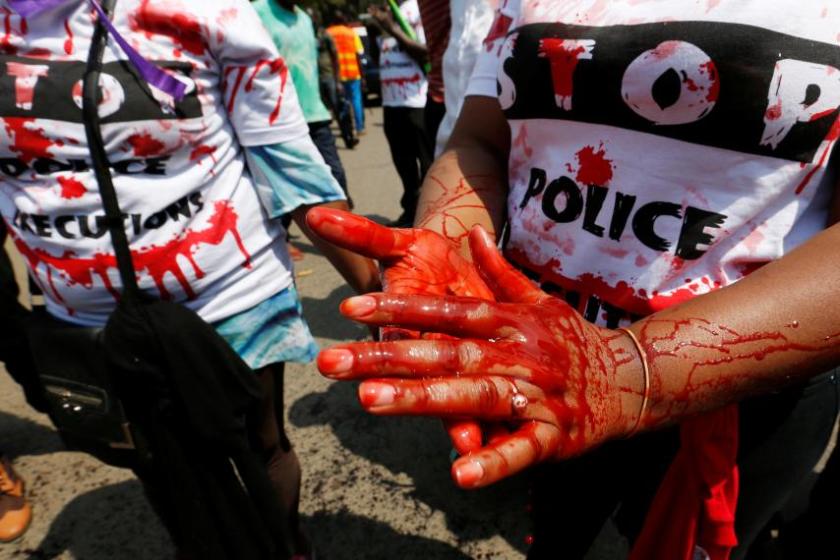 “It used to be that a man could keep out of trouble if he behaved himself. Now he will only keep out of trouble if he behaves himself, (and) if the police behave themselves . . . . ..”
“It used to be that a man could keep out of trouble if he behaved himself. Now he will only keep out of trouble if he behaves himself, (and) if the police behave themselves . . . . ..”
― Agona Apell, The Success Genome Unravelled: Turning Men from Rot to Roc
It is a pattern often seen many a time before.
Abductions, mysterious disappearances/imprisonment often followed by the death of certain individuals in jaded and grey situations. The public is outraged. The media is attentive to every detail of the latest disappearance/extra-judicial killing. Task forces are formed, the police are indignant in the defense of their integrity. Finally, the matter is laid to rest, the death becoming little more than a statistic.
The latest death that prompted exceptional rage involved the shooting of a city High Court advocate.Willy Kimani was representing Josephat Mwendwa,a motor cycle taxi driver who had filed a complaint that he had been shot and injured by police in April of this year.
Following the complaint, Mwendwa was subject to extreme harassment by the police. Finally, as has happened countless of times in this country to persons critical of the government and the police, he “disappeared” alongside Willy Kimani and a Taxi Driver who had picked them up on 23rd June 2016, after attending a court hearing in Machakos County, on the outskirts of Nairobi.
Witnesses said they saw the lawyer and his client in a basement cell of a local police station shortly after the hearing. They Disappeared.
The audacity of the police in picking up the lawyer and his client right outside the court house in the brazen manner in which they were taken into custody speaks volumes about the situation in our country as far as extra-judicial killings go.
Are there plausible solutions?
- The carrot – Stick Approach.
“The British have been funding police reform in Kenya since the early 1990s. They have been pumping money in for that long and had no results and. . . That risk simply strengthening the culture of impunity. You can’t keep on giving carrots. Eventually you need a stick.” Maina Kiai, Human Rights Lawyer.
Perhaps it is time donor countries and groups that financially support the Security Forces in this country develop a firmer system of accountability whereby results are coherent and visible. A good example would be the British Government that has been supporting the Kenya Police to promote Police Reform and strengthen accountability and improve compliance with international human rights standards.
The United Nations has also extensively supported police reform projects in the country. It is not however, an effective method of achieving the same without demanding some sort of visible change. It would seem to the outside eye that things have inadvertently gotten worse. It should be a give and take sort of relationship.
- Strong governmental support.
In more mature democracies, Cabinet Secretaries resign voluntarily whenever their leadership comes into public question. One can hardly say the same for most African nations, Kenya included.
The current Cabinet Secretary in charge of security affairs and others before him have constantly derided the need for reform, casually chiding any instance of Police Enforced deaths and Disappearances with the phrase “investigations are on-going”. They seem to go on with no result in sight in every single instance.
Therefore it would almost seem that these extra-judicial killings and sudden disappearances do indeed have the backing or rather the acquiescence of the Executive.
The president also has a role in that under the constitution, the president has the power to dismiss an incompetent Cabinet Secretary. This is after the convening of a select committee of the National Assembly and its finding of sufficient grounds of dismissal. So why isn’t it happening already? That is a question that begs an answer.
The International Criminal Court had remarked, in the recently concluded cases against the President and the Deputy President that the level of government interference was unprecedented.
Witnesses were brutally intimidated and many were forced to recant their statements, others being found dead.
Without the government’s commitment and good will very little can be achieved. .and the status quo shall remain. Worst case scenario, it may get even worse than it already is if that is even possible.
- Structural reform.
Reform must be visible, and that means the clinical approach to removal of bad apples within the security forces….starting from the lowest level officer to indeed the inspector General himself.
The grounds for the removal of the Inspector General are clearly set out in the constitution. Most grounds are based on the central theme of misbehavior. However there is one specific ground that reads “any other just cause”. This implies that something as serious as the topic of discussion in this article is a sufficient reason for the removal of the current Inspector General.
With regards to the specific officers involved in such actions, It is not enough for the public to hold trials on social media and the Police Department to perform public relations stunts. There must be tangible action. By tangible I mean trials of the officers involved in such offences. Their dismissal or suspension and if possible, use of their own private funds to compensate the families of the victims involved. All this must be in public as it will act as a deterrement to all rogue officers and that it can no longer be business as usual.
Kenya is not police /military state. The Security Forces are servants of the people and should not be at war with them. There is still hope. However, change must be prompt and swift…with the goodwill of the State.
Samantha Oswago
LAED-Kituo Cha Sheria

